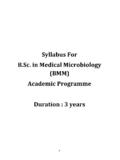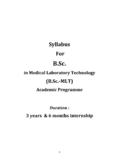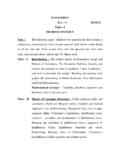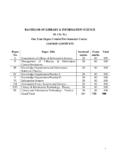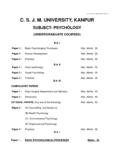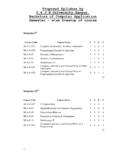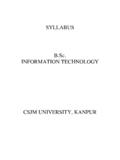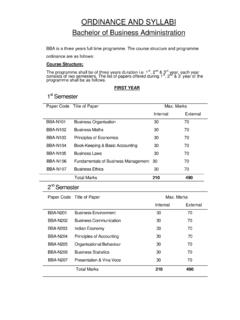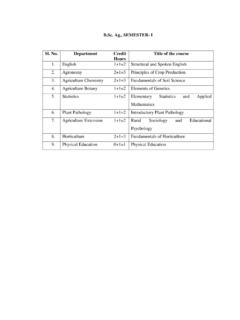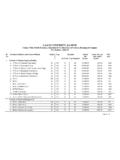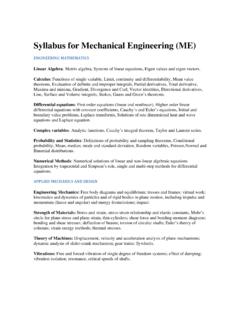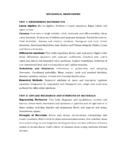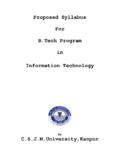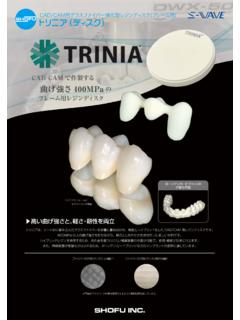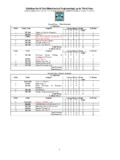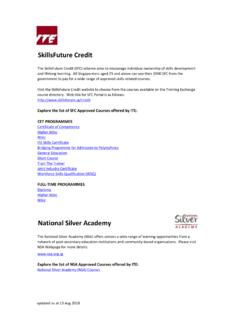Transcription of Proposed Syllabus For B.Tech Program in Chemical …
1 Proposed Syllabus For Program in Chemical Engineering By ,Kanpur Department of Chemical Engineering Program curriculum Semester wise breakup of courses Semester-1 L T P Cr HSS-S101 Communicative English 3 0 0 4 MTH-S101 Mathematics-I 3 2 0 4 PHY-S101T Physics-I 3 1 0 3 PHY-S101P Physics Lab-I 0 0 3 2 ISC-S101T Programming & Computing 3 0 0 3 ISC-S101P Programming Lab 0 0 3 2 TCA-S102T Workshop Concepts 1 1 0 2 TCA-S102P Workshop Practice
2 0 0 3 3 Semester-II CHM-S101T Chemistry-I 3 0 0 3 CHM-S101P Chemistry Lab-I 0 0 3 2 ESC-S101T Basic Electrical &Electronics Engg. 0 0 3 2 ESC-S101P Basic Electrical &Electronics Engg. Lab 3 1 0 4 MTH-S102 Mathematics-II 3 2 0 4 TCA-S101 Engineering Drawing 2 1 3 5 PHY-S102T Physics-II 3 1 0 3 PHY-S102P Physics Lab-II 0 0 3 2 Semester-III MTH-S201 Mathematics-III 3 2 0 4 ESC-S202 Thermodynamics 3 1 0 4 ESC-S201 Engineering Mechanics 3 1 0 4 CHE-S201 Process Calculations 3 1 0 4 CHE-S202 Transport Processes & Unit Operations-I 3 1 0 4 (Fluid Mechanics)
3 Semester-IV CHE-S203 Chemical Engg. Thermodynamics 3 1 0 4 CHE-S204 Transport Processes & Unit Operation-II 3 1 0 4 (Heat Transfer) CHE-S205 Chemical Process Industries-I 3 1 0 4 CHE-S206 Transport Processes & Unit Operation-III 3 1 0 4 (Mechanical Operations) HSS-S401 Industrial Economics 3 0 0 4 Semester-V L T P Cr CHE-S301 Transport Processes & Unit Operation-IV 3 1 0 4 (Mass Transfer-I) CHE-S302 Chemical Process Industries-II 3 1 0 4 CHE-S303P Transport Process & Unit Operations Laboratory -I 0 0 4 4 CHE-S304 Chemical Reaction Engineering-I 3 1 0 4 CHM-S301 Chemistry-II 3 1 0 4 HSS-S301 Professional Communication 1 1 1 2 Semester-VI CHE-S305 Transport Processes & Unit Operations-V 3 1 0 4 (Mass Transfer-II) CHE-S306 Instrumentation & Process Control 3 1 0 4 CHE-S307 Chemical Engg.
4 Design-I 3 1 0 4 CHE-S308P Transport Process & Unit Operations Laboratory-II 0 0 4 4 CHE-S50* Departmental Elective 3 0 0 4 Semester-VII CHE-S401 Chemical Engg. Design-II 3 1 0 4 CHE-S402 Chemical Reaction Engineering -II 3 1 0 4 CHE-S405P Instrumentation & Process Control Lab 0 0 4 4 PRT-S401 Project-I 0 0 6 4 HSS-S201 Industrial Management 3 0 0 4 SST-S301 Summer Training 0 0 2 2 Semester-VIII CHE-S404 Transport Phenomena 3 1 0 4 CHE-S403P Chemical Reaction Engg Lab 0 0 4 4 CHE-S50* Departmental Elective 3 0 0 4 CHE-S50* Departmental Elective 3 0 0 4 PRT-S402 Project-2
5 0 0 6 4 SSM-S401 Student Seminar 0 0 3 2 Note: Total No. of Lectures in each course should in the range of 40 to 45 per semester if per week three lectures are allotted. Departmental Electives: 1. Polymer Engineering (CHE-S501) 2. Safety in Chemical process Industries. (CHE-S502) 3. Petroleum Engineering. (CHE-S503) 4. Environmental Pollution & Control (CHE-S504) 5. Non conventional energy sources (CHE-S505) 6. Numerical methods for Chemical Engineers(CHE S506) 7. Advanced Separation Processes (CHE S507) 8. Optimization Techniques (CHE S508) 9. Biochemical Engineering (CHE S509) 10. Process Modelling and Simulation (CHE S510) Course Code: HSS-S101 Breakup: 3 1 0 4 Course Name: Communicative English Course Details: Unit 1: Basics of Technical Communication: Technical Communication: features; Distinction between General and Technical communication; Language as a tool of communication; Levels of communication: Interpersonal, Organizational, Mass communication; The flow of Communication: Downward, Upward, Lateral or Horizontal (Peer group); Barriers to Communication.
6 Unit 2: Constituents of Technical Written Communication: Word formation, Prefix and Suffix; Synonyms and Antonyms; Homophones; One Word Substitution; Technical Terms; Paragraph Development: Techniques and Methods -Inductive, Deductive, Spatial, Linear, Chronological etc; The Art of Condensation- various steps. Unit 3: Forms of Technical Communication: Business Letters: Sales and Credit letters; Letter of Enquiry; Letter of Quotation, Order, Claim and Adjustment Letters; Memos, Notices, Circulars; Job application and Resumes. Reports: Types; Significance; Structure, Style & Writing of Reports. Technical Proposal; Parts; Types; Writing of Proposal; Significance. Unit 4: Presentation Strategies: Defining Purpose; Audience Organizing Contents; Preparing Outline; Audio-visual Aids; Nuances of Delivery; Body Language; Space; Setting Nuances of Voice Dynamics; Time- Dimension.
7 Unit 5: Value- Based Text Readings: Following essays form the suggested text book with emphasis on Mechanics of writing, (i) The Language of Literature and Science by (ii) Man and Nature by (iii) The Mother of the Sciences by (iv) Humanistic and Scientific Approaches to Human Activity by Moody E. Prior (v) The Effect of Scientific Temper on Man by Bertrand Russell. Text Books and References: 1. Improve Your Writing ed. Arora and Laxmi Chandra, Oxford Univ. Press, New Delhi. 2. Technical Communication Principles and Practices by Meenakshi Raman & Sangeeta Sharma, Oxford Univ. Press 2007, New Delhi. 3. Effective Technical Communication by Barun K. Mitra, Oxford Univ. Press, 2006, New Delhi 4. Business Correspondence and Report Writing by Prof.
8 Sharma & Krishna Mohan, Tata McGraw Hill & Co. Ltd., New Delhi. 5. How to Build Better Vocabulary by Blum, Bloomsbury Pub. London. 6. Word Power Made Easy by Norman Lewis, Pub. & Distributors; Delhi. 7. Developing Communication Skills by Krishna Mohan, Meera Banerji- Macmillan India Ltd. Delhi. 8. Manual of Practical Communication by Pandey & Singh; Publications India Ltd.; Krishan Nagar, Delhi. Course Code: MTH-S101 Breakup: 3 1 0 4 Course Name: Mathematics-I Course Details: Unit I Applications of Integrals : Areas between curves, Methods of finding volume : Slicing, Solids of revolution, Cylindrical shell, Lengths of plane curves, Areas of surface of revolution, Moments and Center of mass, Improper integrals.
9 Unit II Sequences: Definition, Monotonic sequences, Bounded sequences, Convergent and Divergent Sequences. Series: Infinite series, Oscillating and Geometric series, their Convergence, Divergence. Tests of Convergence: nth Term test of divergence, Integral test, Comparison Test, Limit Comparison test, Ratio test, nth root test (Cauchy root test), Alternating series, Absolute and Conditional convergence. Power Series: Power series and its convergence, Radius and interval of convergence, Term by term differentiation, Term by term integration, Product of power series, Taylor and Maclaurin series, Convergence of Taylor series, Error estimates, Taylor s Theorem with remainder.
10 Unit III Vector Calculus: Vector valued functions, Arc length and Unit Tangent vector, Curvature, Torsion and TNB frame . Partial Derivatives: Function of two or more variables (Limit, Continuity, Differentiability , Taylors Theorem ) , Partial derivatives, Chain Rule, Partial Derivatives of higher orders, , Maxima and Minima and Saddle Point, Lagrange Multipliers, Exact differential, Leibniz Theorem. Directional derivatives, Gradient Vectors, Divergence and Curl, Tangent planes . Unit III Multiple Integrals: Double and triple integral, Change of order, Jacobian, Change of variables, Application to area and volume, Dirichlet integral and Applications. Line, surface integrals , Path independence, Statement and problems of Green s, Stoke s and Gauss divergence theorems (without proof).
